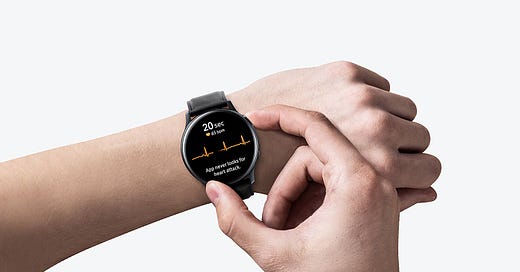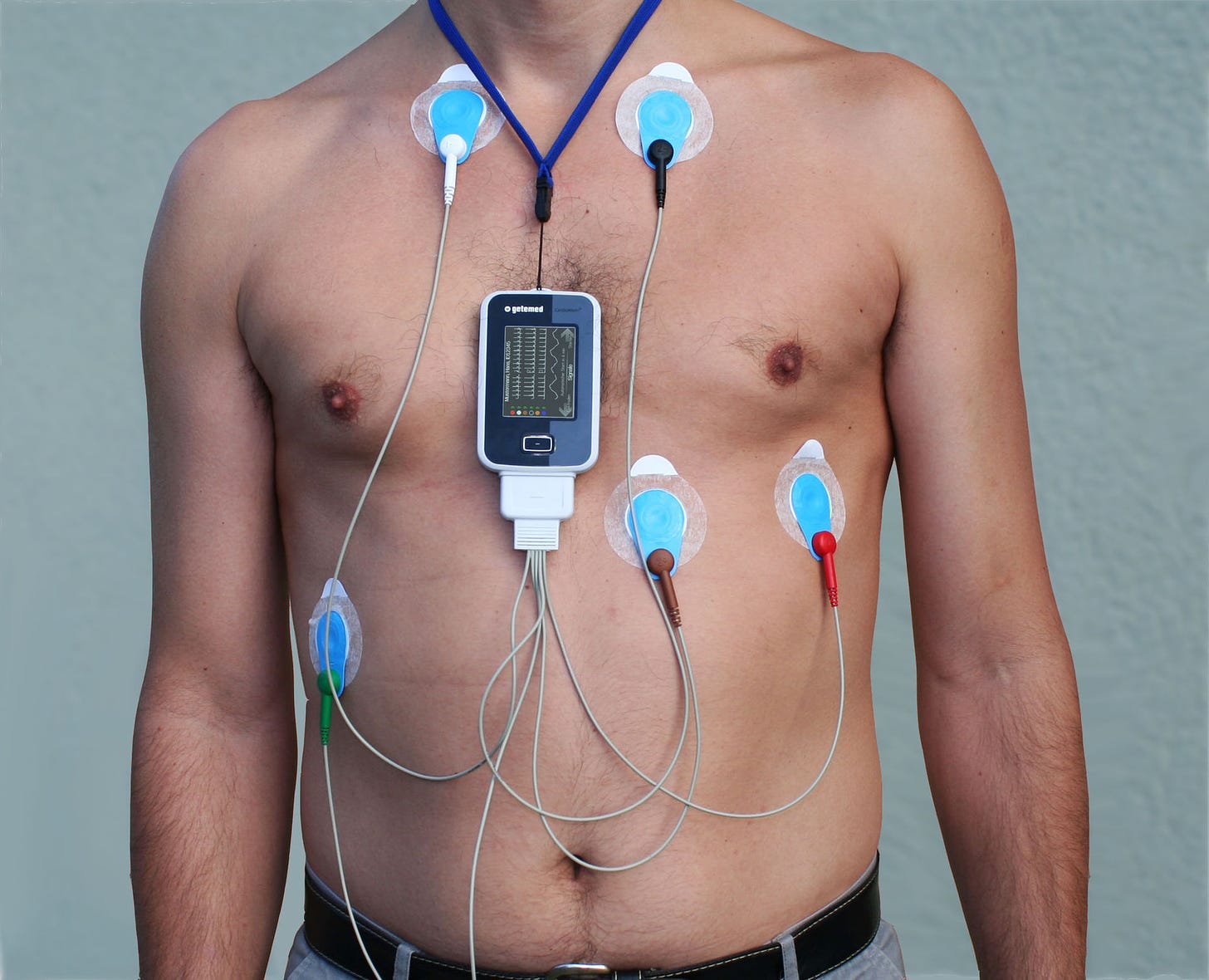This is essay 1 of 6 essays for 1729 Writers Cohort #1. Apply to 1729 today at 1729.com.
After much hesitation, I eventually got a smartwatch. I thought it was a gadget for gym rats, but I realized that smartwatches could help you stay fit and are incredibly useful in disease prevention.
They keep you active
With remote work and delivery services, it’s so easy to stay home all day long. And yet, according to the World Health Organization: “Sedentary lifestyles increase all causes of mortality, double the risk of cardiovascular diseases, diabetes, and obesity, and increase the risks of colon cancer, high blood pressure, osteoporosis, lipid disorders, depression and anxiety.” 😱
Like all other smartwatches, mine1 counts my steps and estimates my activity level. So, if I realize I haven’t done much at the end of the day, it pushes me to go out, at least for a short walk. My watch also reminds me to do some stretching or squats after sitting for more than an hour. This short exercise break is similar to the Pomodoro Technique that I’ve always tried to follow without success. I feel much better now after these short breaks. These two simple features are probably enough to justify the acquisition of a smartwatch.
A lab on your wrist
What’s more, smartwatches such as the Samsung Galaxy Watch 4 measure:
Heart rate,
Stress level, using heart rate variability. It suggests some breathing exercises that work surprisingly well if you’re stressed!
Sleep patterns and snoring,
ECG, with atrial fibrillation detection,
The only other way to measure these metrics is often a heavy device, only available through doctors, such as a Holter monitor. So it’s a miracle that you can now get them with your watch.
Still, even though these features are approved by regulators, they’re not yet as accurate as dedicated medical devices. For instance, the blood pressure on my watch only moderately matches the one given by an arm cuff. Nevertheless, it provides a good range of regular data to send to your doctor. Hypertension is often called the “silent killer”: it’s the 9th leading cause of death in high-income countries, but most people who have it don’t have any symptoms. Detecting it early on is fantastic! A recent study showed that smartwatches could as well help Parkinson’s disease patients manage their postural hypotension, which usually goes undetected. By the way, blood pressure monitoring on Samsung Watch is available all around the world... but not in the US, as the FDA hasn’t approved it yet… We should have the right to try such devices. It’s yet another example that we need more technologically-progressive jurisdictions.
And it’s only the beginning. Smartwatches will soon measure blood sugar levels in a non-invasive way! Today 415 million people worldwide are living with diabetes, and they may have to check their blood glucose several times a day. A non-invasive device will make their lives easier. On top of that, diabetes is the 9th leading cause of death globally, with an estimated 1.5 million deaths. And yet, 50% of diabetics are undiagnosed. This problem is not limited to developing countries: even in the US, 21% of patients are undiagnosed. Type 2 diabetes, the most common form of diabetes, is largely preventable by following a healthy lifestyle. Still, one-third of Americans have prediabetes: their blood sugar levels are higher than normal but not high enough to be diagnosed with diabetes. The vast majority of prediabetics don’t know it. They only realize it when they start developing diabetes and related symptoms. It’s too late then. But contrary to diabetes, prediabetes is reversible, and early diagnosis using a smartwatch could prevent thousands of people from developing diabetes.
Similarly, Apple is working on sleep apnea detection for the Apple Watch, using the existing blood-oxygen sensor as SpO2 levels decrease during sleep apnea. About 1 billion people worldwide suffer from obstructive sleep apnoea (OSA), and most are unaware of it. OSA is associated with neurocognitive morbidities such as attention and memory deficits. If diagnosed, a simple device such as eXciteOSA (20 min daily neuromuscular stimulation of the tongue) can reduce mild OSA by 50% after 6 weeks.
Whether it’s hypertension, diabetes, or sleep apnea, early detection by smartwatches and subsequent treatment could improve the quality of life of millions of people and save thousands of lives.
The researchers’ best friend
Besides prevention, smartwatches are helpful for research. For instance, there’s much discussion about “Long Covid,” some doctors claiming it’s only psychosomatic. However, Fitbit analyzed data from people with positive Covid-19 tests and concluded that it took a month for sleep quantity to return to normal after infection and almost three months for resting heart rate (RHR), which is way longer than for other viral infections. For about 14% of COVID-19–positive participants, their RHR did not return to normal after more than 133 days: they may suffer from “Long Covid.” Without wearable devices, we would never have been able to reach such a conclusion before. Another study also proved that Covid could be detected 3 days before symptom onset with a Fitbit or an Apple Watch!
About one in five Americans use a smartwatch or fitness tracker, and almost half of them would agree to share their data with health researchers. “You can’t improve what you don’t measure”: for centuries, medicine was running blind, and for the first time, we’ll have continuous records of the essential physiological data for millions if not billions of individuals. So I predict that the massive trove of data generated by smartwatches will become crucial in medical research and lead to discoveries.
Hypochondriacs beware!
Smartwatches are lovely, but this “quantified self” trend has a dark side: anxiety. I noticed it myself: after I got my smartwatch, I started checking everything all the time. I was sometimes anxious when some metrics were below or above the “normal” values… At least during these moments, the stress detector worked quite well and recommended some deep breathing exercises. 😅
Goodhart’s law states: “When a measure becomes a target, it ceases to be a good measure.” Smartwatches are no exception. Researchers found that some sleep tracking users had an unhealthy obsession with getting perfect “sleep scores,” which actually worsened their insomnia! They coined a new term for that condition: orthosomnia.
Conclusion
If you don’t have a smartwatch and want to be more active, I think it’s worth it.
If you own one: what’s your experience? Did it help you to stay healthy?
I may be too excited about smartwatches as I’m still in my “honeymoon phase.” Do you share my optimism? Is there a bearish case for wearable devices? Let me know what you think!
I have a Samsung Galaxy Watch Active 2. I assume other watches offer similar features.






I really enjoyed this article, man. You made such a good case that as soon as I was done I clicked on your link and will probably buy your same watch, ha! That's such a shame that the heart rate monitor isn't approved in the US. You're totally right that that's evidence that we need innovation in our regulatory structure.
I came back to this great piece after a couple of months because I've been thinking about fitness tracking and how it can help both at the personal, individual level and also feeding into research. Just to explore the trends you're laying out, what if in 5-10 years, the percentage of the population using fitness trackers goes from 20% to 80-90%, and the percentage willing to share their data also increases from 50% to 80-90%? The rate of sharing data could be increased by compensating people for their data. There are already [efforts](https://www.computerworld.com/article/3655950/blockchain-firm-equideum-and-nokia-building-exchange-to-let-patients-sell-healthcare-data.html) underway to do this. It would be a world of ubiquitous, continual clinical trials, benefiting the average person both through health advances and a very low-effort, though probably modest, income opportunity. And this world seems more like a simple extrapolation from current trends than a wild fantasy.